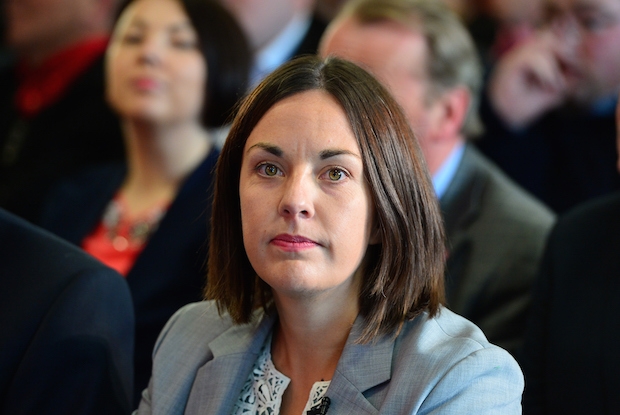When Kezia Dugdale was elected Scottish Labour leader, she tweeted: ‘Mission: Impossible has a happy ending, right?’ As she steps down from the job, Dugdale is getting enough praise to suggest that her mission has a happy ending. But is that really fair?
She leaves with more Scottish Labour MPs in Westminster than she started with: impressive, given many had assumed Scottish Labour was dead for at least a generation after the SNP surge in 2015. But then again, she leaves with her party in third place at Holyrood. Her critics on the Left will argue that the party’s recovery in its Scottish seats was far more down to Jeremy Corbyn than it was to her. Corbyn’s critics still can’t quite bring themselves to accept that winning seats can be a test of whether someone is a good leader: for them, it’s winning power in government, or nothing.
And Dugdale hasn’t helped out her moderate comrades by stepping down now. The Scottish Labour leader had a place on the Labour party’s National Executive Committee, which has been finely balanced between left and right. Her place kept the balance in favour of the centrists. Her departure means that Alex Rowley, the MSP who is now the interim leader of the party, takes her NEC place just as conference season begins. Rowley is a Corbynite member of the left. This means that any battles over changes that Corbyn and his team want to make to the party’s structure, how the leader is elected in future and deselections of MPs and so on, now have a Corbynite majority supporting them on the NEC. Unite issued a statement today urging the party not to rush into a leadership contest because ‘under Alec Rowley’s interim leadership we are confident that the voices of Scotland’s working people will be heard loud and clear at Holyrood’. It’s unlikely that Unite would be welcoming an extended interim leadership from a Corbyn opponent.
Dugdale spoke out against Corbyn in the second Labour leadership contest. But she wasn’t a bulwark of strength against the left in her party: she ceded power over decision-making on some issues to them, and indulged them on policies such as Trident renewal when Scottish Labour didn’t even need to take a position on the reserved matter.
She did mess up on the question of Scottish independence in a 2016 interview with the Fabian Review, saying it was ‘not inconceivable’ that she could ‘argue, for Scotland’s sake, against the UK Union’ if the country voted to stay in the European Union but the rest of the UK voted to leave. She also ended up in a highly unhelpful row with Nicola Sturgeon during the 2017 snap election after the SNP leader claimed Dugdale had spoken privately to her after the Brexit referendum to say ‘Brexit changed everything and she didn’t think Labour could go on opposing a second referendum’.
But that clumsiness was accompanied by a more systemic weakness on the question of the constitution. She pitched Scottish Labour as a boring version of the nationalists, suggesting reforms which would pull Scotland further apart from the Union but stopping short of the exciting proposition of independence. In December 2016, she called for a new Act of Union which would involve a ‘federal solution’ for the UK. Labour had started devolution as a trap for the Tories, but was now caught up in the trap itself, having to appear SNP-lite. Meanwhile, the Scottish Tories had complete freedom to pitch themselves as the unshakeable Unionists in the debate, which they did with aplomb.
These errors were better, though, than the bitter battle that is to come in Scottish Labour between the left and centrists. Dugdale surprised her party with her resignation – many MSPs only found out over WhatsApp – but she had appeared rather exhausted by the grind of leading the party. Her statement suggested that she had decided there was more to life than politics. Many people outside Holyrood and Westminster would agree with that. But it’s not an attitude you want from the person leading your party, for whom every battle should feel worth it. If Dugdale had decided that every battle now felt pointless, that’s a good reason to leave. But leaving now suggests she feels even the battles her colleagues will take up, such as those on the Labour NEC, are pointless, which isn’t such an admirable decision.







Comments